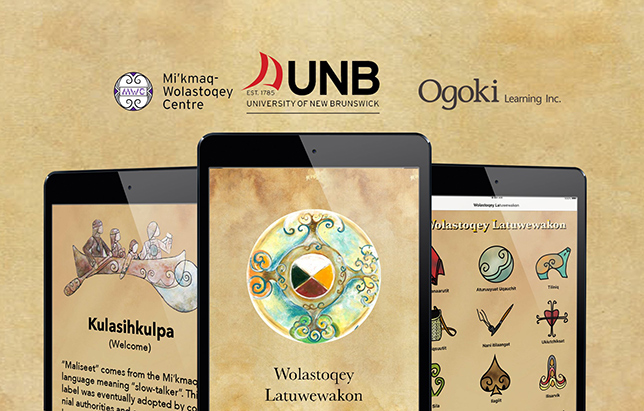Over the last few years, UNB has taken strides to encourage Indigenous teachings and culture on campus and consequently has supported indigenous language preservation and revival.
The MWC (Mi’kmaq-Wolastoqey Centre) offers elders to help guide beginners through Wolastoqey language. In an effort to revitalize the languages on the UNB Fredericton campus, the Mi’kmaq-Wolastoqey Centre has recently launched an app that outlines and teaches the traditional languages as elders would teach them.
Keywords and important phrases such as seasons, days of the week, holidays, weather and kinship are spelled out in English, then repeated back in the Wolastoqey language. The guide section is where the basic letters and words are located, along with pronunciations.
The creators of the Wolastoqey Latuwewakon App, Elders Imelda and David Perley, wanted a way to teach the language, without students having to find an elder to teach them in person, as not everyone is so lucky to have fluent speakers in their lives.
Their warm words of welcome are located on the app, “We are so happy you have decided to take a journey that will nourish your spirit by acquiring basic language skills.”
“Our Elders believe that our language connects us to our ancestral teachings and promotes a worldview that emphasizes respectful relationships between persons, and between humans and the natural environment. In short, our destination is the maintenance of our language, to be cherished and protected for future generations,” reads the Welcome page.
The app’s intention is to make the languages more accessible to those who feel inclined to learn. Indigenous youth and community members alike, are welcome to learn the language and the culture. Unfortunately, Indigenous languages have struggled to survive the colonial efforts to eradicate them. European Canadians have historically not been kind to the legitimacy of the respective Indigenous languages. Most infamously, the ploy of residential schools implanted fear in speaking one’s mother tongue, which nearly drove Indigenous languages to extinction. Revitalization of the largely lost languages has been at the forefront of Indigenous Rights activists because language is held at the utmost importance.
When people speak their mother tongue, it is special because it is theirs. There is no other power or control being placed upon them, nor is there a constant reminder of their colonization every day. Chief Allan Polchies of St. Mary’s Wolastoqiyik in Fredericton, says vehemently that “when you speak your language, you speak your identity, your culture.” Individually, it is a way to connect with oneself, with one’s ancestors, and one’s spirituality in a greater context.
Most prominently, language is how we connect with others. Chief Polchies elaborates, “we got to save the language for our children and all the seven generations before us.” To honour elders, and those who have passed, and to also allow youth to come into their culture with the knowledge that elders have. Groups experience a disconnection between generations due to the limited speakers of the language, many of them being Elders. The app is meant for the students of today, for the purpose of maintaining the culture of the students of tomorrow.




